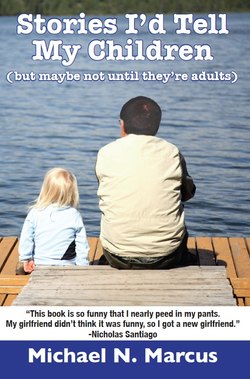Читать книгу Stories I'd Tell My Children (But Maybe Not Until They're Adults) - Michael N Marcus - Страница 9
На сайте Литреса книга снята с продажи.
Chapter 2 Love can kill
ОглавлениеIn the 1959-60 school year, I was in eighth grade in the Dr. Susan S. Sheridan Junior High School in New Haven, Connecticut. Our curriculum included a course called “Core” that combined English and history.
Our Core teacher was Winnifred, an elderly spinster with a name and personality that belonged in the 1600s. She was a prude to the extreme and equally stern. If she was Catholic and not Protestant, she would probably have been a knuckle-whacking nun in a parochial school.
Her sole concession to levity in our classroom was a life-sized, cardboard, stand-up Santa Claus that advertised Coca-Cola.
When Fidel Castro was in the U.S. to visit the United Nations, “Winnie” wore a black armband to protest his presence. Politically, she was slightly to the right of Attila the Hun. Sexually, she had probably never seen a penis except in a picture, and the horror of potential penetration undoubtedly traumatized her.
Much of our class time was spent diagramming sentences and copying what Winnie wrote on the blackboard.
She explained that her words would make a stronger impression on our young minds if we had to write them down than if we merely heard them or read them on a mimeographed handout sheet. The real reason was probably that if we were busy copying from the blackboard, she wouldn’t have to teach.
In one blackboard lecture, Winnie warned us that “any writer who uses writing as a source of income is unworthy of being read.” Better cross Shakespeare, Dickens, Melville, Fitzgerald and Hemingway off our reading list. The list of potentially worthy writers was made smaller still, because Winnie declared that any writer who mentioned sex or love was off-limits to young teenagers. There went Aristophanes, King Solomon, Charlotte Brontë and yours truly.
When the young teenagers in our class giggled at the two dirty words in the line, “Stand like harpers hoar, with beards that rest on their bosoms” in Longfellow’s Evangeline, Winnie barked at us, with orders to “get your minds out of the gutter,” and a reminder that “the body is a temple.”
One time while walking around the classroom, Winnie spied a paperback book on Alan Melnick’s desk. It was a copy of The Untouchables, the basis for the TV series starring Robert Stack as FBI agent Elliot Ness.
Curious, Winnie picked up the book, and flipped through the pages. When she realized that the cover illustration showed an FBI raid on a whorehouse, she dropped it as if it was on fire and ran to the sink to purify her hands and soul. The next day, Winnie was absent from school.
Our substitute teacher was Elizabeth Krick, an equally old, old lady but Winnie’s polar opposite in personality, politics and prudery.
Winnie was out for a long time, and the months when Mrs. Krick replaced her were a trip to an intellectual Disneyland. The dreaded sentence-diagramming sessions were gone, there were no notes to copy from the blackboard and we were encouraged to read ANYTHING we wanted to.
I found a strange paperback book entitled The Wayward Comrade and the Commissars, by Yurii Karlovich Olesha—definitely not a book that commie-hating Winnie would approve of.
It contained one novelette and three short stories, and Mrs. Krick agreed that Alan would report on the novelette, Envy, and I’d cover the short stories.
Alan got the best part, which included the memorable line, “How pleasant my life is. Ta-ra. Ta-ra. My bowels are elastic. Ra-ta-ta. Ta-ra-ree. My juices flow within me. Ra-tee-ta. Doo-da-da. Contract, guts, contract. Tram-ba-ba-boom!”
My part of the book was not as stimulating, but a deal is a deal, so I started reading and writing.
On the day we were to deliver our book reports, the sky was dark, Mrs. Krick was gone, Winnie was back, and I was in shock.
There was no way in hell that Winnie would accept a “book report” on three short stories, especially if the three short stories were written by a detested Russian.
I had to do some quick improvising. I decided to verbally inflate one of the stories into a full-length book and hoped some creative bullshit would help get me through the crisis.
Unfortunately, the one short story that had enough of a plot to support my embellishment was titled Love.
When it was time for me to deliver my report, I quivered at the front of the classroom, put a hand in front of my mouth, and mumbled something like “I am reporting on Grphshnrf Moknop Cribnuk by Hrebdrop P. Fnarp.”
Winnie asked me to repeat it, and I mumbled something like “I am reporting on Klapfnak Heebdump by Fligglediggle Narknark.”
That didn’t satisfy Winnie either, and she demanded that I speak CLEARLY AND LOUDLY.
The jig was up. I was caught with pants down. There was no turning back. I couldn’t claim that my dog ate my homework.
So, I looked down at the floor and inhaled deeply, then raised my head, stared straight at the back of the classroom, and proudly announced to the world that “I am reporting on LOVE, by YURII KARLOVICH OLESHA.”
Winnie clutched her chest, screamed and ran from the classroom.
Love gave Winnie a heart attack.
The next day the sun shone brightly, and Mrs. Krick was back at the desk in the front of the room.
